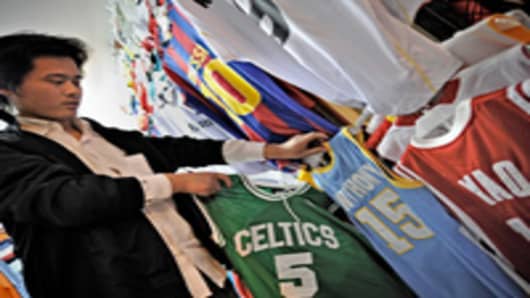Counterfeiting costs American businesses alone more than $200 billion and, not surprisingly, the sports apparel counterfeiting business is continuing to grow.
Brand protection company MarkMonitor analyzed five major sports brands and concluded that there were more than 1,300 e-commerce Web sites selling questionable jerseys. These sites, the company says attract more than 56 million annual visits and sell an estimated 800,000 jerseys a year.
MarkMonitor CMO Frederick Felman says, like the rest of the counterfeiting world, these sites are getting more sophisticated by either selling jerseys that look like they are real or showing real pictures to try to make a sale.
And Felman says that counterfeiters have also learned that consumers are more wooed by deals that aren’t as drastic.
“Years ago, we saw they would try to woo the public with dramatically different price points, offering discounts of at least 50 percent,” Felman said. “Now, price points are aren’t all that different, as they’ve found that 15 to 20 percent discounts can still get a buyer.”
MarkMonitor also discovered that counterfeiters were willing to pay for Internet advertising. The company monitored almost 480,000 paid search ads and concluded in this study that 28 percent of all online paid advertising came from sites selling counterfeit sports gear.
So if the jersey looks as good as the real one—and they paid less for it—do fans care?
“Twenty percent of fans who buy counterfeit goods have no idea they are counterfeit,” Felman said. “But when they are told they are counterfeit, most of them do find that it is less dear to them.”
MarkMonitor helps leagues and organizations shut down the counterfeiters through its automated systems that identify likely counterfeits, which has also become harder.
“We initiated one transaction where we called a Dallas phone number, the person answering the phone was Russian, the credit card was processed in Israel and it was drop shipped from India and we received the product two months after we ordered it,” Felman said.
In recent years, leagues have had many problems with sports memorabilia dealers in particular who buy counterfeit jerseys to get them signed. The counterfeit shortcuts, which normally reveal themselves by wear and cleaning, don’t ever manifest themselves because those who buy jerseys with signatures on them don’t ever wear them. MarkMonitor estimates that more than 300,000 unlicensed jerseys are sold in bulk to businesses each year.
Questions? Comments? SportsBiz@cnbc.com




